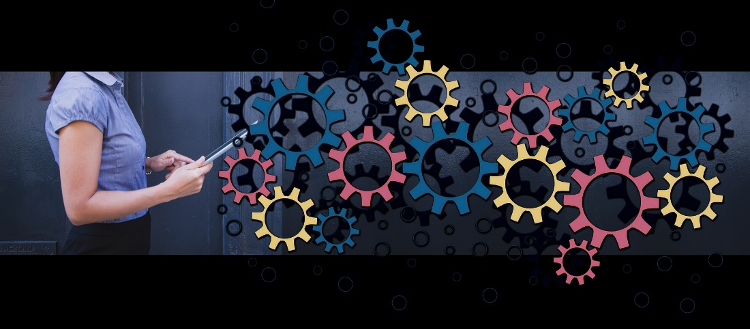
By: Luke Mattison
We are witnessing a new era of technological innovation. Each year, machines get more advanced and the software that controls them becomes smarter and more adept at automating ever more complex processes.[1] As we continue to refine and train these tools of the 21st century to make our work easier at what point do humans become obsolete?
In 2012, Amazon purchased Kiva Systems, a robotics company specializing in making mobile robots which can move large amounts of boxes efficiently around a warehouse with little to no human intervention.[2] Amazon’s $775 million investment has since blossomed into a robot workforce measuring 200 thousand strong, bringing Amazon one step closer to a nearly fully mechanized workforce.[3] While impressive, Amazon’s lofty goals and extreme investments are not unique. In 2016, DHL began a two-robot pilot program so that DHL could evaluate the long-term benefits of automating its workforce.[4] Two years later, DHL announced a $300 million investment into integrating additional robots into its factories.[5] Similarly, a large supplier of chipsets for companies like Samsung and Apple eliminated 60 thousand workers in favor of robotic replacements.[6] This new change in the demographics of the American workforce has been called the Fourth Industrial Revolution.[7]
Surprisingly, while some studies have estimated that as many as 30-50% of jobs could disappear as a result of increased automation, few solutions have been offered.[8] Prominent Bills such as Bill Gates and New York City Mayor Bill de Blasio have called for a “robot tax” to disincentive businesses from investing into technologies aimed at replacing human workers.[9] Other experts argue that such a temporary salve would only serve to slow the pace of automation and would make little difference in the long run.[10] Another significant problem with this approach is that it would require courts to first define what exactly a robot is for purposes of the new tax on a case by case basis.[11] Currently the American tax system has no way of sorting technology that displaces workers from technology that aids workers, and any such distinction settled upon could quickly shift as technology continues to grow and change.[12] Supporters argue that these issues are minor, but such a tax has yet to gain traction within the U.S.[13]
Another solution offered has been to
raise the wage floor by instituting a Universal Basic Income (“UBI”).[14] Supporters of a UBI, such as former United
States Presidential Candidate Andrew Yang, argue that it would use taxes on
companies that profit most from automation to provide a basic floor of income
for displaced workers.[15] This would potentially allow them to more
easily provide for themselves long enough to get a new and different job.[16]
Supporters also argue that doing this
would allow workers to turn down unfavorable jobs, which in turn would help to
mitigate the unemployed labor market from skyrocketing and wages from
plummeting.[17] While the idea of a UBI was originally
scoffed at as a cure for massive job loss caused by automation, it has been
gaining serious attention lately as a potential response to the massive job
loss caused by the Novel Coronavirus (“Covid-19”) pandemic.[18] Supporters of a UBI in response to automation
argue that it could have the same economic boosting effect expected from the
short term UBI in response to the Covid-19 pandemic.[19] Whichever ends up being the case, one need
not look further than the U.S.’s ill-preparedness regarding the Covid-19
pandemic to guess how the U.S. will respond to the impending job loss due to
automation.
[1] See generally Why IT Automation?, ActiveBatch (Mar. 22, 2020), https://www.advsyscon.com/en-us/activebatch/why-it-automation (discussing some of the increase in complexity and availability of various types of software).
[2] Jason Del Ray, How Robots are Transforming Amazon Warehouse Jobs – For Better and Worse, Vox (Dec. 11, 2019), https://www.vox.com/recode/2019/12/11/20982652/robots-amazon-warehouse-jobs-automation.
[3] Id.
[4] Companies Already Replacing Humans with Robots, Love Money (Feb. 14, 2019), https://www.lovemoney.com/gallerylist/61607/companies-already-replacing-humans-with-robots.
[5] Id.
[6] Robot vs. Humans: Workers of the Future, DMZ, https://dmz.ryerson.ca/robot-vs-humans-workers-of-the-future/ (last visited Mar. 23, 2020).
[7] Jamie Morgan, The Fourth Industrial Revolution and the Struggle for a Preferred Future, Governing (Jan. 15, 2020), https://www.governing.com/next/The-fourth-industrial-revolution-could-lead-to-a-dark-future.html.
[8] Jamie Morgan, The Fourth Industrial Revolution and the Struggle for a Preferred Future, Governing (Jan. 15, 2020), https://www.governing.com/next/The-fourth-industrial-revolution-could-lead-to-a-dark-future.html (citing Carl B. Frey & Michael A. Osborne, The Future of Employment: How Susceptible are Jobs to Computerisation?, 114 Tech. Forecasting & Soc. Change 254, (2017)).
[9] Compare Joseph Zeballos-Roig, The Idea of a ‘Robot Tax’ is Gaining Steam as a Way of Dealing With Automation That’s Killing Jobs, Markets Insider (Jan. 9, 2020), https://markets.businessinsider.com/news/stocks/robot-tax-gains-steam-job-killing-automation-work-economy-2020-1-1028807242, with Orly Mazur, Taxing the Robots, 46 Pepp. L. Rev. 277 (2019).
[10] Id.
[11] See Richard Rubin, The ‘Robot Tax’ Debate Heats Up, The Wall Street Journal (Jan. 8, 2020), https://www.wsj.com/articles/the-robot-tax-debate-heats-up-11578495608 (discussing the various views the tax system could take on robots).
[12] Id.
[13] Id.
[14] Brad Stollery, Universal Basic Income Is an Inevitable Part of Our Automated Future, Medium (Feb. 20, 2018), https://medium.com/age-of-awareness/universal-basic-income-is-an-inevitable-part-of-our-automated-future-3cc181d4778d.
[15] Id.
[16] Id.
[17] Id.
[18] Karl Widerquist, America Is in Crisis. We Need Universal Basic Income Now, The Guardian (Mar. 20, 2020), https://www.theguardian.com/commentisfree/2020/mar/20/america-coronavirus-recession-universal-basic-income.
[19] Id.

